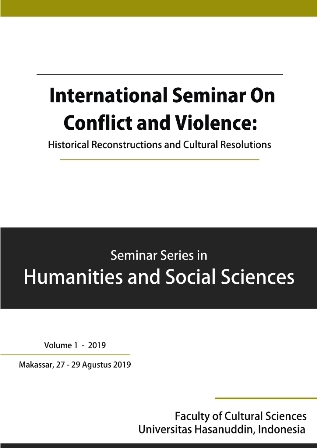A CONFLICT RESOLUTION OVER THE CASE THE THE REJECTION OF THE CONSTRUCTION OF THE AL-AQSHA SENTANI GRAND MOSQUE TOWER JAYAPURA REGENCY BASSED ON WITH LOCAL WISDOMS
DOI:
https://doi.org/10.3405/ssihss.v0i1.8619Abstract
This research is a qualitative-descriptive study that aims to explain conflict resolution the case of rejection carried out by the Guild of Churches in Jayapura Regency (PGGJ) towards the construction of the tower of the Agung Sentani Mosque in Jayapura Regency based on local wisdom. The data was collected by interview, observation, and document study. The results of the research show that the thought of Tabi (the traditional territory of Sentani) as the Land of the Gospel is the basis of the PGGJ's rejection of the construction of minarets higher than the surrounding church buildings. PGGJ issued a statement letter containing 8 points that sparked controversy. The Jayapura District Government took a quick step in dealing with this problem with a family approach and formed a mediation team consisting of representatives from various groups. The mediation formed succeeded in formulating the points of peace based on the philosophical points of Sentani’s local wisdom due to khena mbay umbai. So that they could be accepted by all parties, especially the PGGJ. The formulation of the peace points was signed bye the regent and thus of construction of the al-Aqsa Sentani Grand Mosque was deemed complete. Keywords: rejection, Grand Mosque Al-Aqsha, PGGJ, local wisdomDownloads
References
Afwan, Budi Asyhari. 2015. Mutiara Terpendam Papua: Potensi Kearifan Lokal Untuk Perdamaian Di Tanah Papua. Yogyakarta: CRCS.Al-Makassary, Ridwan. 2017. Insiden Tlikara Dan Ja’far Umar Thalib. Jayapura: Kementerian Agama Provinsi Papua.Asnawi, Mu’aliyah Hi. 2016. ―Resolusi Knflik Berbasis Nilai-Nilai Kearifan Lokal.‖ Jurnal Keguruan Dan Ilmu Pendidikan (JKIP) 3 (2): 198–203.Kasniyah, Naniek. 2012. Tahapan Menentukan Informan Dalam Penelitian Kualitatif. Yogyakarta: Ombak.Sabara. 2015a. ―Merawat Kerukunan Dengan Kearifan Lokal Di Kabupaten Muna Sulawesi Tenggara.‖ Al-Qalam 21 (2): 203–12.———. 2015b. ―Pembangunan Rumah Ibadat Pasca PBM Nomor9 Dan 8 Tahun 2006 Di Manado.‖ In Dilema Pembangunan Rumah Ibadat, edited by Darlis, 285–322. Yogyakarta: Ladang Kata.———. 2018a. ―Kiprah Setengah Abad Yaysan Islam (YAPIS) Papua: Membangun Harmoni Beragama Melalui Dunia Pendidikan.‖ Al-Qalam 24 (1): 65–72.———. 2018b. ―Split Nasionalisme Generasi Muda Di Papua DiKota Jayapura: Perspektif Teori Identitas.‖ Politik Profetik 6 (1): 1–18.———. 2019. ―Transformasi Nasionalisme Dan Politik Identitas Orang Asli Papua.‖ In , edited by Wahyuddin Halim, 195–244. Yogyakarta: Lintas Nalar.Soekanto, Soedjono. 1982. Pengantar Penelitian Hukum. Jakarta: UI Press.Sujito, Arie, Bambang Hudayana, Fajar Sudarwo, Haztanti Windy Nugroho, Heru Nugroho, Lambang Trijono, and Susetiawan. 2009. Meretas Jalan Perdamaian Di Tanah Papua. Edited by Krisdyatmiko. Yogyakarta: IRE.Utoyo, Marsudi. 2016. ―Akar Masalah Konflik Keagamaan Di Indonesia.‖ Lex Librum 3 (1): 367–75.Widiyowati, Estu, Rachmat Kristiyantono, and Bambang Dwi Prasetyo. 2018. ―Model Manajemen Konflik Berbasis Kearifan Lokal: Konflik Perguruan Pencak Silat Di Madiun-Jawa Timur.‖ Komunikator 10 (1): 34–47.Wulung, Andy, Woro Wahyuningtyas, and Manberob Rumaklek. 2017. Melihat Kasus Tolikara Dari Papua: Monograf Tolikara. Jakarta: Pustaka Sinar Harapan

